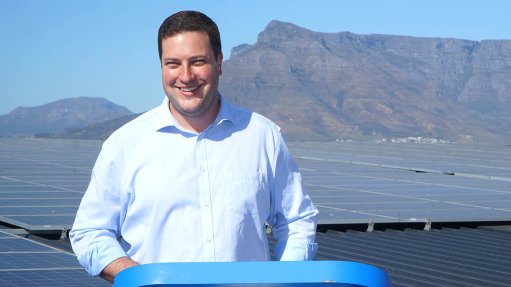PIC calls for greater private investment to bridge Africa’s $170bn infrastructure gap
The Public Investment Corporation (PIC) has called for more investment to bridge Africa’s infrastructure gap in its second research paper, titled ‘Using Listed and Unlisted Financial Instruments to Fund Infrastructure on the Continent’, under the theme of ‘PIC Perspectives: G20 Dialogues’.
Two of the technical work streams of the G20 Finance Track, which is led by the National Treasury and the South African Reserve Bank, were relevant to the PIC’s research, namely infrastructure and sustainable finance.
Infrastructure is about developing an investable infrastructure pipeline, scaling up sustainable infrastructure through blended finance approaches and delivering cross-border infrastructure for regional development; while sustainable finance is focused on strengthening the global sustainable finance architecture, scaling up financing for adaptation and a just transition and unlocking the financing potential of carbon markets.
According to the PIC, Africa faces formidable infrastructure investment shortfalls, estimated at between $130-billion and $170-billion a year, for essential power, transport, water and digital systems, leading to underpowered energy, fragmented transport and limited digital connectivity.
The lack of infrastructure investment suppresses productivity, hinders regional integration and imposes significant economic and social costs, particularly on rural and low-income communities.
The second PIC research paper argues for recalibrated funding instruments. While public financing remains foundational, including government budgets allocated for large-scale infrastructure projects, these are limited owing to fiscal constraints. Concessional loans provided by development banks offer favourable terms to support underfunded sectors and improve project bankability.
“Foreign aid, often tied to international cooperation, delivers critical funds for social infrastructure but is insufficient to meet the scale of demand. A vital resource is private capital,” the research paper argues.
Listed instruments include infrastructure bonds, utility shares and infrastructure real estate investment trusts that provide liquidity and broader participation from institutional investors. Unlisted instruments, such as direct project finance, private equity and dedicated infrastructure funds, enable targeted investments at project level.
Launching the second research paper at a public engagement with private sector asset managers, development finance institutions, pension funds and its clients, PIC chairperson Dr David Masondo emphasised the critical role of private investment alongside other institutional investors, including public development agencies.
Incentives to stimulate private investment are being considered by government.
Masondo said a credit guarantee mechanism for private investment to expand South Africa’s electricity transmission infrastructure, is being developed by the National Treasury. It is expected to go to market in July 2026.
“The key challenge for us in the public sector is infrastructure efficiency. Our task as government is to put together incentives to attract capital to flow into infrastructure,” he explained.
Credit guarantees provide a form of insurance to de-risk long-term investment into economic infrastructure, Masondo said.
PIC CEO Patrick Dlamini explained that many emerging economies “… have come out of poverty because there was a meaningful drive for infrastructure development”.
The financial sector can be a catalyst to drive new, innovative investment opportunities in cross-border infrastructure projects in the Southern African Development Community region, particularly in the energy sector.
Dlamini appealed for partnerships with other fund managers to advance bankable development projects over the next 12 months. These should be modelled on South Africa’s Renewable Energy Independent Power Producer Procurement Programme that has, since 2010, facilitated large-scale private investment into the energy sector.
Article Enquiry
Email Article
Save Article
Feedback
To advertise email advertising@creamermedia.co.za or click here
Comments
Press Office
Announcements
What's On
Subscribe to improve your user experience...
Option 1 (equivalent of R125 a month):
Receive a weekly copy of Creamer Media's Engineering News & Mining Weekly magazine
(print copy for those in South Africa and e-magazine for those outside of South Africa)
Receive daily email newsletters
Access to full search results
Access archive of magazine back copies
Access to Projects in Progress
Access to ONE Research Report of your choice in PDF format
Option 2 (equivalent of R375 a month):
All benefits from Option 1
PLUS
Access to Creamer Media's Research Channel Africa for ALL Research Reports, in PDF format, on various industrial and mining sectors
including Electricity; Water; Energy Transition; Hydrogen; Roads, Rail and Ports; Coal; Gold; Platinum; Battery Metals; etc.
Already a subscriber?
Forgotten your password?
Receive weekly copy of Creamer Media's Engineering News & Mining Weekly magazine (print copy for those in South Africa and e-magazine for those outside of South Africa)
➕
Recieve daily email newsletters
➕
Access to full search results
➕
Access archive of magazine back copies
➕
Access to Projects in Progress
➕
Access to ONE Research Report of your choice in PDF format
RESEARCH CHANNEL AFRICA
R4500 (equivalent of R375 a month)
SUBSCRIBEAll benefits from Option 1
➕
Access to Creamer Media's Research Channel Africa for ALL Research Reports on various industrial and mining sectors, in PDF format, including on:
Electricity
➕
Water
➕
Energy Transition
➕
Hydrogen
➕
Roads, Rail and Ports
➕
Coal
➕
Gold
➕
Platinum
➕
Battery Metals
➕
etc.
Receive all benefits from Option 1 or Option 2 delivered to numerous people at your company
➕
Multiple User names and Passwords for simultaneous log-ins
➕
Intranet integration access to all in your organisation


















